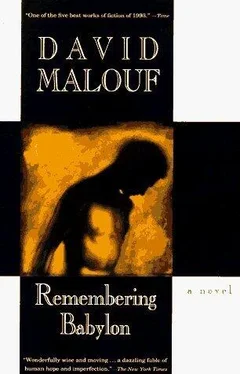The conversation he had begun back there, he again caught up with. He had been unaware, in his preoccupation with the trees and the sky, that it had been going on all this time at the bottom of his thought. He let it lead him, and was already lost in its pleasant intricacies when he saw, hunkered down beside the track, a figure that startled him at first, and then, when he saw who it was, moved him in a way he had not expected.
It was Gemmy Fairley waiting for the McIvor girls, to see them home. He would have greeted the fellow, and found he was disappointed when Gemmy kept his head lowered, and would not look up to receive the gesture he meant to make.
GEMMY FAIRLEY HAD been in the settlement for almost a year. He was working alone one afternoon, slapping fresh planks onto the side of a shed, when he felt the hair on the back of his neck stiffen. He swung round with the hammer raised and they were already on him, two blacks, an old man and a youth, standing quietly just feet away. He had not heard them coming. Making a sign that a white observer would have missed, he dropped his gaze, lowered himself painfully into a cross-legged position, and waited. The two blacks followed and they sat, all three, in a clump, just where they were.
The sign was not visible to Barney Mason’s rouseabout, Andy, who was sinking fence posts a hundred yards off on the crest of the ridge; but he did see the rest of it. He had had his eye on those blacks for a good ten minutes.
Watching them emerge out of the ti-tree swamp, the old bloke leading, very tall and thin and gliding like on his feet, he had made a good guess at where they were headed, and laying aside the crowbar, reached for his gun. He followed them all the way down the gully, then, allowing odd minutes for the thick overhang down there, picked them up again just where he expected, on the slope, where Gemmy Fairley’s hammer blows were breaking the clear late afternoon stillness.
‘Got yez,’ he whispered.
If they had strayed even an inch on to Barney’s side of the boundary he would have taken a pot at them; he would have felt justified in that. But they did not.
At one point, out in the open, they paused and looked up, bold as brass, to where he stood, pretty well hidden he had thought, and saw him, he was sure of it; any road, recorded he was there. Then boldly turning their backs on him and with no further interest in whether or not he was observing, the old one, high-shouldered and floaty, still in front, walked on. The bloody effrontery of it! The cheek! The gall!
A moment later the hammer paused, he saw Gemmy swing round; and the next thing they were sitting, all three, with their heads together having a powwow. Right there in the open where anyone could see them. Didn’ even bother to move to the shady side of the shed, as a white feller would, where they couldn’ be seen. Just sat like that in the open, maybe twenty minutes, maybe more.
‘Oh I kep’ me eye on ’em, you can bet on that!’ (Andy, in the excitement of having something to tell, was already telling the thing to himself.) ‘I seen every fucken move they made, you bet I did. Every fucken move. Then them two blacks got up and went right back on the path they come by.’
For a moment Gemmy had continued to sit; he saw that too. Then, slowly, he pushed himself up, reached for a handful of nails, and it was only when the first hammer blows came flying out across the gully that Andy, with a jerk, came back from the walk his mind had taken, all the way to where it had been hovering about down there, trying to catch what the confab was about, and discovered he had, back here, a fit of the pins and needles, and had to hop about, cursing, till he had worked the feeling back into his leg.
When this last bit of him had returned, he set off, shotgun in hand, at a steady pace — no need to rush — to where the feller was at work again, the sound of the hammer bouncing hard off the hillside and whipping round his ears.
Andy was in a state of high indignation. What he had just seen, he told himself fiercely, was just what he, for one, had all along suspected. The bastard was in touch with them. Always had been, secretly, and was ready now to do it openly. In broad daylight! Just wait, he told himself, till Barney hears.
He had worked for Barney for nearly two years. They weren’t close, but he knew Barney; he knew what his thoughts were on the subject of Gemmy bloody Fairley. They were the same as his own. Out of loyalty to his mate, Jock, he hummed and harred and wouldn’t admit it, but it showed. He was an open book, Barney. If he got into one of his worrying fits you couldn’t miss it. Well, it was a good thing, to stick to your mate — he believed that as much as the next feller. But what about me, he asked himself fiercely, what am I then? All I do is bloody work me guts out for ’im, stick up for ’im, keep me eyes open, always thinkin’ of their welfare. So why can’t you come to me, Barney, like a white man, and come out with what’s on your mind. It wouldn’ go further.
In the growing hurt to his pride, which was only part of the greater resentment he felt at the many injustices that had been practised on him, he strode fiercely downhill.
Back in Brisbane, in the time after his wife skipped off, he had had a good deal of strife, some of it with the law. He had broken into the chandler’s he worked at and stole a few bob from the till — well, six pounds in fact, and done a year in the clink. He blamed her . And the Californian — a very smart feller, big talker, who for a time, he admitted, had had an influence over him.
His wife had hated the bloke at first. Jealous! And had ended up bloody running off with him — what about that, then? Could you credit it? And after being drunk for a week, and getting himself into all sorts of brawls, he had gone one night to the back door of McDowells and broken in and taken the six quid, but why he had done it and how he expected to get away with it, he couldn’t say; any more than he could say why his wife, Lorrie, after sounding off for months about what a loud mouth Earl Whitney was, and a cheat and liar, should suddenly up and run off with him. He had known from the start he was the first man they would come after. So how foolish can a man be?
The world was a puzzle to Andy McKillop. He was a puzzle to himself. Two years back, he had come up here just on the off-chance looking for work, and by using some of the fast talk he had picked up from the Californian, who continued to exert a hold over him, had persuaded Barney Mason, who was a decent cove, but soft, to give him a go. He was grateful for that. He had promised himself then that he would never let Barney down, and save for the odd breakout, which left him soreheaded and sorry for himself (he continued to blaze inwardly with a ferocity that only drink, at times, could dull), he had not. He had tried to be a mate to Barney, got sentimentally fond of Polly and the kids. That they were not as fond of him as he would have liked them to be was a disappointment, but he was used to disappointments.
As for this Gemmy — well he knew blacks, he’d had experience of ’em. In his worst period, down there, he had shared a bottle or two with the locals — it wasn’t a thing he was proud of, but never mind — and had been off, once or twice, to their camp — he didn’t boast of that, either. But it was experience. He knew ’em!
‘G’day,’ he said with a sour mouth when he reached the shed. He leaned his shoulder against the wall in a very casual manner, but the blast of heat off it got to him through his shirt and he had to shift. It unsettled him, that small mischance, but he recovered and felt descend upon him the large dignity of one who was here as a representative. ‘I see you been receivin’ visitors,’ he said, rather pleased with the understated humour he commanded.
Читать дальше












